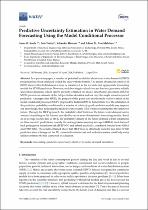 ResearchSpace
ResearchSpace
Predictive uncertainty estimation in water demand forecasting using the model conditional processor
JavaScript is disabled for your browser. Some features of this site may not work without it.
- ResearchSpace
- →
- Research Publications/Outputs
- →
- Journal Articles
- →
- View Item
| dc.contributor.author |
Anele, AO

|
|
| dc.contributor.author |
Todini, E

|
|
| dc.contributor.author |
Hamam, Y

|
|
| dc.contributor.author |
Abu-Mahfouz, Adnan MI

|
|
| dc.date.accessioned | 2018-10-05T10:23:19Z | |
| dc.date.available | 2018-10-05T10:23:19Z | |
| dc.date.issued | 2018-04 | |
| dc.identifier.citation | Anele, A.O. et al. 2018. Predictive uncertainty estimation in water demand forecasting using the model conditional processor. Water, vol. 10(4): 1-12 | en_US |
| dc.identifier.issn | 2073-4441 | |
| dc.identifier.uri | https://www.mdpi.com/2073-4441/10/4/475 | |
| dc.identifier.uri | https://doi.org/10.3390/w10040475 | |
| dc.identifier.uri | http://hdl.handle.net/10204/10445 | |
| dc.description | This is an Open Access journal published in Water, vol. 10(4): 1-12 | en_US |
| dc.description.abstract | In a previous paper, a number of potential models for short-term water demand (STWD) prediction have been analysed to find the ones with the best fit. The results obtained in Anele et al. (2017) showed that hybrid models may be considered as the accurate and appropriate forecasting models for STWD prediction. However, such best single valued forecast does not guarantee reliable and robust decisions, which can be properly obtained via model uncertainty processors (MUPs). MUPs provide an estimate of the full predictive densities and not only the single valued expected prediction. Amongst other MUPs, the purpose of this paper is to use the multi-variate version of the model conditional processor (MCP), proposed by Todini (2008), to demonstrate how the estimation of the predictive probability conditional to a number of relatively good predictive models may improve our knowledge, thus reducing the predictive uncertainty (PU) when forecasting into the unknown future. Through the MCP approach, the probability distribution of the future water demand can be assessed depending on the forecast provided by one or more deterministic forecasting models. Based on an average weekly data of 168 h, the probability density of the future demand is built conditional on three models’ predictions, namely the autoregressive-moving average (ARMA), feed-forward back propagation neural network (FFBP-NN) and hybrid model (i.e., combined forecast from ARMA and FFBP-NN). The results obtained show that MCP may be effectively used for real-time STWD prediction since it brings out the PU connected to its forecast, and such information could help water utilities estimate the risk connected to a decision. | en_US |
| dc.language.iso | en | en_US |
| dc.publisher | Predictive uncertainty estimation in water demand forecasting using the model conditional processor | en_US |
| dc.relation.ispartofseries | Worklist;21356 | |
| dc.subject | Forecasting | en_US |
| dc.subject | Predictive uncertainty | en_US |
| dc.subject | Short-term water demand | en_US |
| dc.subject | STWD | en_US |
| dc.subject | Water demand simulation | en_US |
| dc.title | Predictive uncertainty estimation in water demand forecasting using the model conditional processor | en_US |
| dc.type | Article | en_US |
| dc.identifier.apacitation | Anele, A., Todini, E., Hamam, Y., & Abu-Mahfouz, A. M. (2018). Predictive uncertainty estimation in water demand forecasting using the model conditional processor. http://hdl.handle.net/10204/10445 | en_ZA |
| dc.identifier.chicagocitation | Anele, AO, E Todini, Y Hamam, and Adnan MI Abu-Mahfouz "Predictive uncertainty estimation in water demand forecasting using the model conditional processor." (2018) http://hdl.handle.net/10204/10445 | en_ZA |
| dc.identifier.vancouvercitation | Anele A, Todini E, Hamam Y, Abu-Mahfouz AM. Predictive uncertainty estimation in water demand forecasting using the model conditional processor. 2018; http://hdl.handle.net/10204/10445. | en_ZA |
| dc.identifier.ris | TY - Article AU - Anele, AO AU - Todini, E AU - Hamam, Y AU - Abu-Mahfouz, Adnan MI AB - In a previous paper, a number of potential models for short-term water demand (STWD) prediction have been analysed to find the ones with the best fit. The results obtained in Anele et al. (2017) showed that hybrid models may be considered as the accurate and appropriate forecasting models for STWD prediction. However, such best single valued forecast does not guarantee reliable and robust decisions, which can be properly obtained via model uncertainty processors (MUPs). MUPs provide an estimate of the full predictive densities and not only the single valued expected prediction. Amongst other MUPs, the purpose of this paper is to use the multi-variate version of the model conditional processor (MCP), proposed by Todini (2008), to demonstrate how the estimation of the predictive probability conditional to a number of relatively good predictive models may improve our knowledge, thus reducing the predictive uncertainty (PU) when forecasting into the unknown future. Through the MCP approach, the probability distribution of the future water demand can be assessed depending on the forecast provided by one or more deterministic forecasting models. Based on an average weekly data of 168 h, the probability density of the future demand is built conditional on three models’ predictions, namely the autoregressive-moving average (ARMA), feed-forward back propagation neural network (FFBP-NN) and hybrid model (i.e., combined forecast from ARMA and FFBP-NN). The results obtained show that MCP may be effectively used for real-time STWD prediction since it brings out the PU connected to its forecast, and such information could help water utilities estimate the risk connected to a decision. DA - 2018-04 DB - ResearchSpace DP - CSIR KW - Forecasting KW - Predictive uncertainty KW - Short-term water demand KW - STWD KW - Water demand simulation LK - https://researchspace.csir.co.za PY - 2018 SM - 2073-4441 T1 - Predictive uncertainty estimation in water demand forecasting using the model conditional processor TI - Predictive uncertainty estimation in water demand forecasting using the model conditional processor UR - http://hdl.handle.net/10204/10445 ER - | en_ZA |





